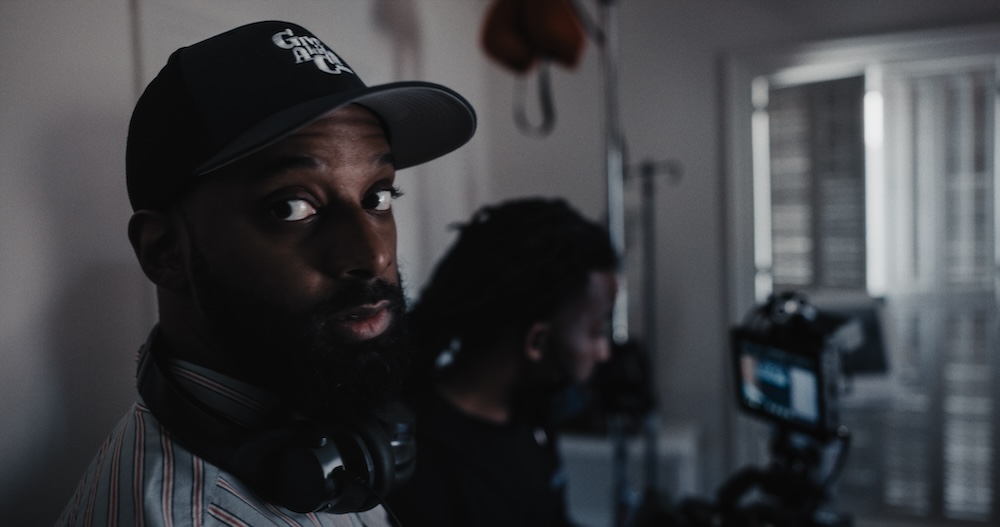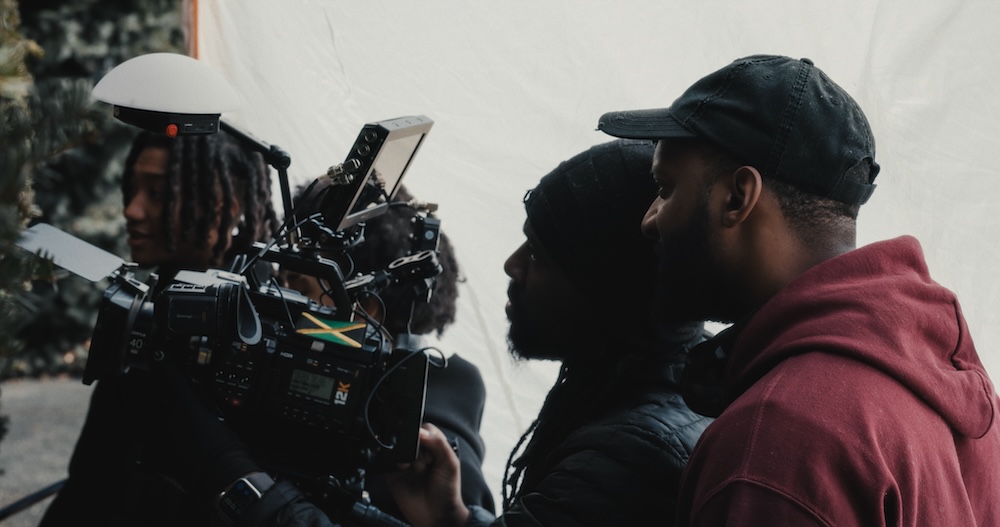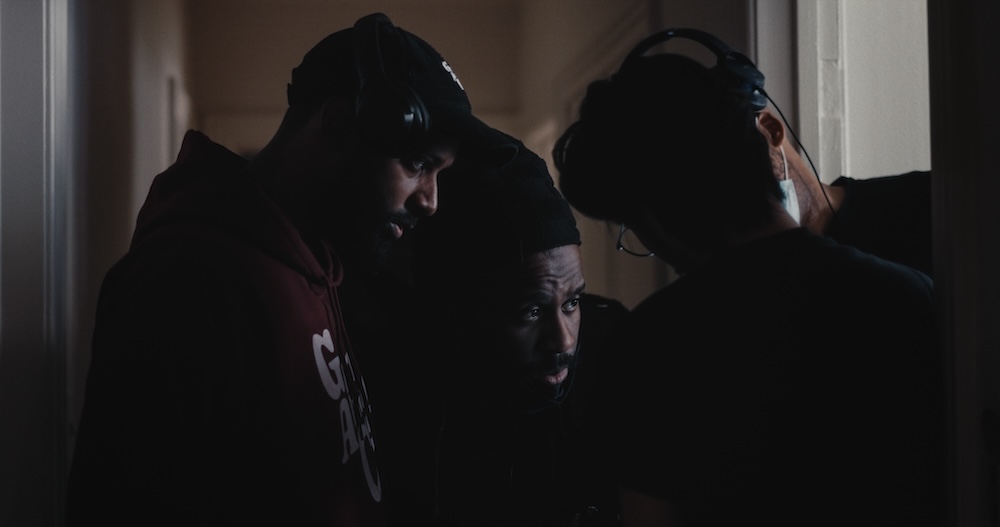In the feature film I Wish I Could See Heaven, the protagonist, Me, can be seen as both villain and victim; soft and ruthless. So you know there’s some unpacking to do to understand his mental state and the actions that follow.

In the feature film I Wish I Could See Heaven, the protagonist, Me, can be seen as both villain and victim; soft and ruthless. So you know there’s some unpacking to do to understand his mental state and the actions that follow.
Coming from misFitted, LLC––a multimedia production company and creative art house rooted in Detroit––writer/director Zachary Cunningham along with cinematographer Charles Kennedy Jr. and an ensemble cast starring Don Snipes, create a world that takes viewers on a psychological trip where fate and redemption are brought into question.
Me is a contract killer suffering from post-traumatic stress disorder (PTSD), and also taking care of his mother who’s been in a coma for years at the hands of someone close to her. There’s internal conflict as Me struggles to reconcile with actions from the past, the life he leads now, and consequences that follow.
In conversation with Zach and Charles, we discuss their film and cultivating trust and brotherhood in the land of filmmaking in Detroit.
LaToya: Zach, I was thinking about the title of your film, I Wish I Could See Heaven––is it literal, conceptual, subjective to the character––what is identified as Heaven in this feature?
Zach: I had the title kind of sitting around – so, when I started writing this script, I had the idea. The way I brainstorm is coming up with a protagonist and then I usually come up with a unique dynamic that builds interests. With my film ‘In A Sentimental Mood’, it was a man who’s trying to write a letter to his wife, who is deceased. With this film, he’s a contract killer, but he’s taking care of his mother who’s been in a coma. It’s an interesting dynamic. When I was writing it, I was thinking through a character who’s reconciling with this idea of taking care of somebody who he resents.
I viewed the title like I wish I could see heaven, but I want my mom back. I wish I could see heaven, and can make all of this go away. I wrote the entire script from his perspective, questioning: what happens when somebody wants to die, but they want to live too?
LaToya: Woah; the depth of that. There’s a scene in the film where a young version of the main character is with his mother and they’re looking out of a window and singing the words, I wish I could see heaven. Without giving too much away, can you tease the significance of that moment?
Zach: He’s seeing a vision of his younger self with his mom and they’re looking across the Detroit River to Canada. His mom always called Canada heaven. She says ‘that’s heaven over there’ because she sees moving there as a new beginning for herself. Biblically, if you think of the land of milk and honey––the promised land; Windsor is like her promised land––a new beginning to get out of the cycle of abuse.
For him, when he gets older and thinks back to the moment, it’s like an acceptance of his fate––wishing his trauma could get cleansed and he could start anew. If there’s any redemption for that character, there’s that.
I wrote the entire script from his perspective, questioning: what happens when somebody wants to die, but they want to live too? – Zach
LaToya: Charles, on the visual aspect, you’re taking us through the emotion, inside the character’s head. It’s intense. Can you discuss your lighting choices and setting the tone and aesthetic for this film and how we see each character?
Charles: Zach will usually write pages and then send them as he goes, so I was reading as the script was being written, and when I read it in its entirety for the first time, Oppenheimer had come out and one thing the Director of Photography (Hoyte van Hoytema) who shot that said in his interviews was that they shot in large format IMAX, and they got really close to exaggerate the face and make the film about faces. That was something that I felt reading Zach’s script. We talked about the headiness of the film, getting inside of Me’s head and just learning the psychology of this person. So, we used our 25mm HERO lens and got right up in people’s faces. Because we’re so close, when you look at a lot of the frames, especially the night interior shots, I had a light on the camera to put a little specular light, a little twinkle in their eyes.
LaToya: Why is I Wish I Could See Heaven an important story to tell?
Charles: When we were talking about the rollout plan, one thing we talked about was the importance of seeing four Black men come together and create something like this. We all have a stake in it. I haven’t seen this kind of film––especially with an all Black cast. The story about going back to take care of someone you resent, thinking about what our environment teaches us, and what we become–it’s incredibly important. Me’s environment was filled with illegal activity and violence; that shaped him to be who he is. But at the core, you still see the humanity in him.
Zach: One thing to speak about is the social commentary in the film, and what’s said without being spoken. Chuck handled that on the visual aspect.
The story about going back to take care of someone you resent, thinking about what our environment teaches us, and what we become–it’s incredibly important. – Charles

LaToya: As creatives, we can be sensitive about our ideas and execution but desire so much and want to produce and share our projects. When did you reach the level of trusting each other and establishing a community, a brotherhood in this industry?
Zach: From the beginning. Our first experience with each other was working together on a film called Right On. Chuck was our assistant director (AD) on the film we did called Right On, so he got a chance to see our process, but he was coordinating it. So I think he had a natural idea on how I work.
Charles (Chuck): With me coordinating the production, Z immediately got to see and know how I work. And then he directed it and wrote it, so I got to see the breakdown of the script and how he works. It was like a crash course. We got to see each other under duress and when we’re feeling good. It clicked. We bonded over that experience quite a bit, and afterwards it was just like, man, this is dope. It doesn’t feel forced. It doesn’t feel like one has to change who they are in order for us to be able to work.

LaToya: And now, many films and projects in your portfolio and building this team–what’s the feeling?
Charles: I’m extremely proud of our work, the process, and what we’re able to do. Since we’ve done Affliction and then In a Sentimental Mood, it’s almost like a blueprint. And now with ‘Heaven’, it’s a manifestation of perseverance and perfecting the process. It’s proof of what you can do when you have an entire team who bought into a single goal; a vision. I’m just proud of this. It’s all credit to the team.
Zach: It’s a foundation. We always talked about creating our own stuff. We’re not stopping from here. When me and Don met back in 2015, we always talked about this. Me and Chuck went into this with a motto: No compromises. We didn’t have a ton of money, but the mindset is if we want to do something, let’s figure out a way to do it. We cracked the code, so we’re about to keep going.
Below check out footage from the film’s screening, thanks to Logan for sharing with us!
About the Author
LaToya Cross
LaToya “toi talese” Cross is an arts and culture writer and producer whose work has been featured by WDET 101.9FM – Detroit’s NPR Station, Essay’d, EBONY, JET, SouthSideWeekly.com, blkcreatives.com. She is passionate about telling stories that center creatives using their platform to shift, shape, and analyze culture through an artistic lens.
